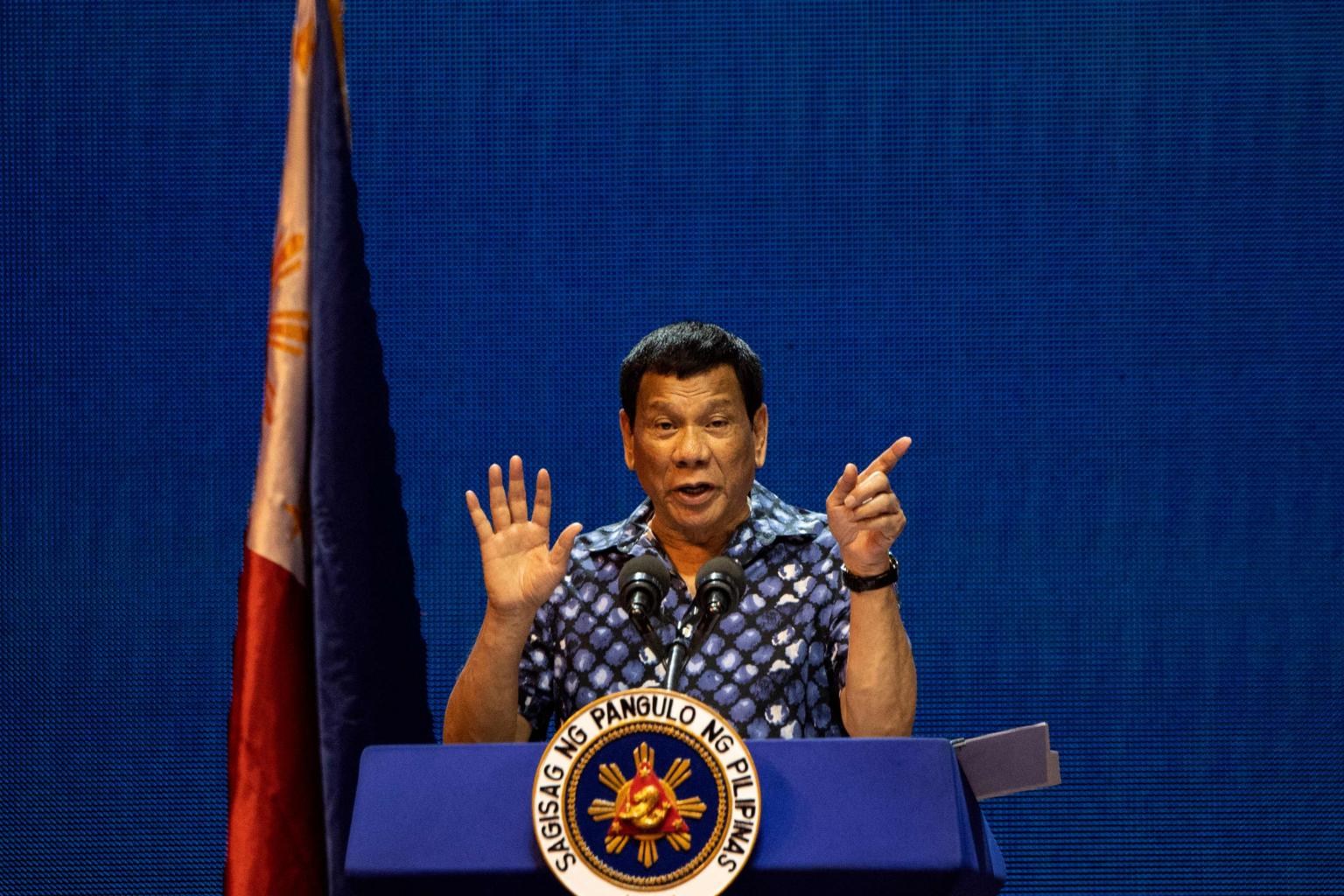Filipinos vote in largely peaceful midterm elections marred by vote-buying allegations, machine glitches
Sign up now: Get insights on Asia's fast-moving developments

President Rodrigo Duterte is known internationally for his foul-mouthed tirades, but remains hugely popular among Filipinos fed up with the country's general dysfunction and leaders who have failed to fix it.
PHOTO: AFP
MANILA - Nearly 62 million Filipinos headed to the polls on Monday (May 13) to vote in midterm elections that were largely peaceful but marred by vote-buying and faulty vote-counting machines.
"We're seeing a lot of precincts open, and a lot of voters were able to cast their votes successfully. It's generally successful," Commission on Elections (Comelec) spokesman James Jimenez told reporters.
Half of the 24 seats in the Senate and all 297 seats in the House of Representatives are at stake. Some 43,000 candidates are also contesting for around 18,000 local posts.
There were no indications of significant violence, but there were widespread reports of vote-buying and breakdowns in hundreds of machines used to tally votes.
General Oscar Albayalde, the national police chief, said at a news conference there were "massive vote-buying incidents".
"We got reports left and right," he said, adding that 302 campaign workers were arrested purportedly with envelopes, cash and sample ballots meant to buy votes. They were said to be offering from 300 pesos (S$7.80) to 3,000 pesos to secure votes for their candidates.
A high-profile candidate running for mayor of metropolitan Manila's largest city was arrested on Sunday after he tried to intervene when law enforcers began arresting his supporters at a supposed "vote-buying site". He was released hours later on an "obstruction of justice" charge.
A high-profile candidate running for mayor of metropolitan Manila's largest city was arrested on Sunday after he tried to intervene when law enforcers began arresting his supporters at a supposed "vote-buying site". He was released hours later on an "obstruction of justice" charge.
Voting early in the day was marred by reports of malfunctioning vote-counting machines.
Former vice-president Jejomar Binay was unable to vote because one such machine failed to read his ballot.
"This is a way of disenfranchising voters... This is another way of reducing votes," he told reporters. The machine was later replaced, and he eventually managed to cast his vote.
Mr Jimenez said 400 to 600 vote-counting machines suffered glitches throughout the day. But he stressed that these still represented just a fraction of the over 80,000 vote-counting machines deployed for the elections.
"We never said this would be a perfect election… With so many machines used, it is inevitable that some will experience malfunctions. That's why we have backup capacity," he said.
The midterm elections were billed as a referendum on Mr Duterte, and a showdown between his allies who aim to dominate the 24-seat Senate and opposition candidates fighting for checks and balances under a leader they regard as a looming dictator.
Since taking office in 2016, Mr Duterte has presided over a brutal war on drugs that has left more than 5,000 suspects dead. He has also been relentless in attacking anyone who criticised his drug war: human rights advocates, bishops and journalists.
He has vowed a "harsher" war on drugs, and is seeking to reinstate the death penalty, as big-time drug gangs continue to flood the Philippines with methamphetamine and cocaine.
Mr Duterte has also upended the Philippines' foreign policy, steering the country away from its traditional ally, the United States, and moving closer to China in search of funds to bankroll his ambitious, but still stalled, infrastructure programme.
He has put forward a controversial plan to shift from a unitary to a federal form of government, in a bid to spread wealth in one of Asia's fastest-growing economies. He also wants to cut corporate tax rates to attract more investments.
All these plans were said to be on the line in the midterm polls.
By most accounts, the election results will strengthen Mr Duterte's hands and further marginalise a dwindling opposition.
The opposition is facing an unprecedented shutout, as the Otso Diretso (Straight Eight) alliance has a long shot at winning the last Senate seat up for grabs.
Eight candidates from the Hugpong ng Pagbabago (Caucus for Change) coalition helmed by Mr Duterte's daughter, Davao City mayor Sara Carpio, meanwhile, are guaranteed to win Senate seats.
"Although the opposition has tried to raise territorial issues, tax reform, it hasn't resonated as much with voters," said Mr Bob Herrera-Lim, managing director at political risk consultancy firm Teneo.
Security forces have been on red alert since Friday, with more than 200,000 soldiers and policemen deployed to secure some 36,000 polling centres.
Colonel Noel Detoyato, the military's public affairs chief, said there were election-related violent incidents that led to at least 20 deaths, but these were "very isolated". In 2016, the tallied nearly reached 200.
In war-torn Mindanao, where political clans, separatists and militants still hold sway, "this year's poll is shaping up to be no different", according to the World Bank-funded think-tank International Alert Philippines.
The group tallied 43 reports that "depicted a campaign period… that saw candidates and their supporters engage in mudslinging, vote-buying, intimidation and threats, harassment, physical fights and violence with the use of firearms".
Comelec has tagged the whole of Mindanao, an island the size of South Korea, as a "hot spot", with 540 cities and towns there classified as "areas of grave concern".
Three bombs were set off in Maguindanao province. But these were meant more to scare voters than to cause mass casualties, security officials said.
Security forces persuaded about 60 former separatist guerillas from reaching a polling centre, and there was a skirmish with a small group of militants.
There were also reports of fistfights and rock-throwing involving supporters of rival candidates. But overall, the elections were generally peaceful, said Col Detoyato.


